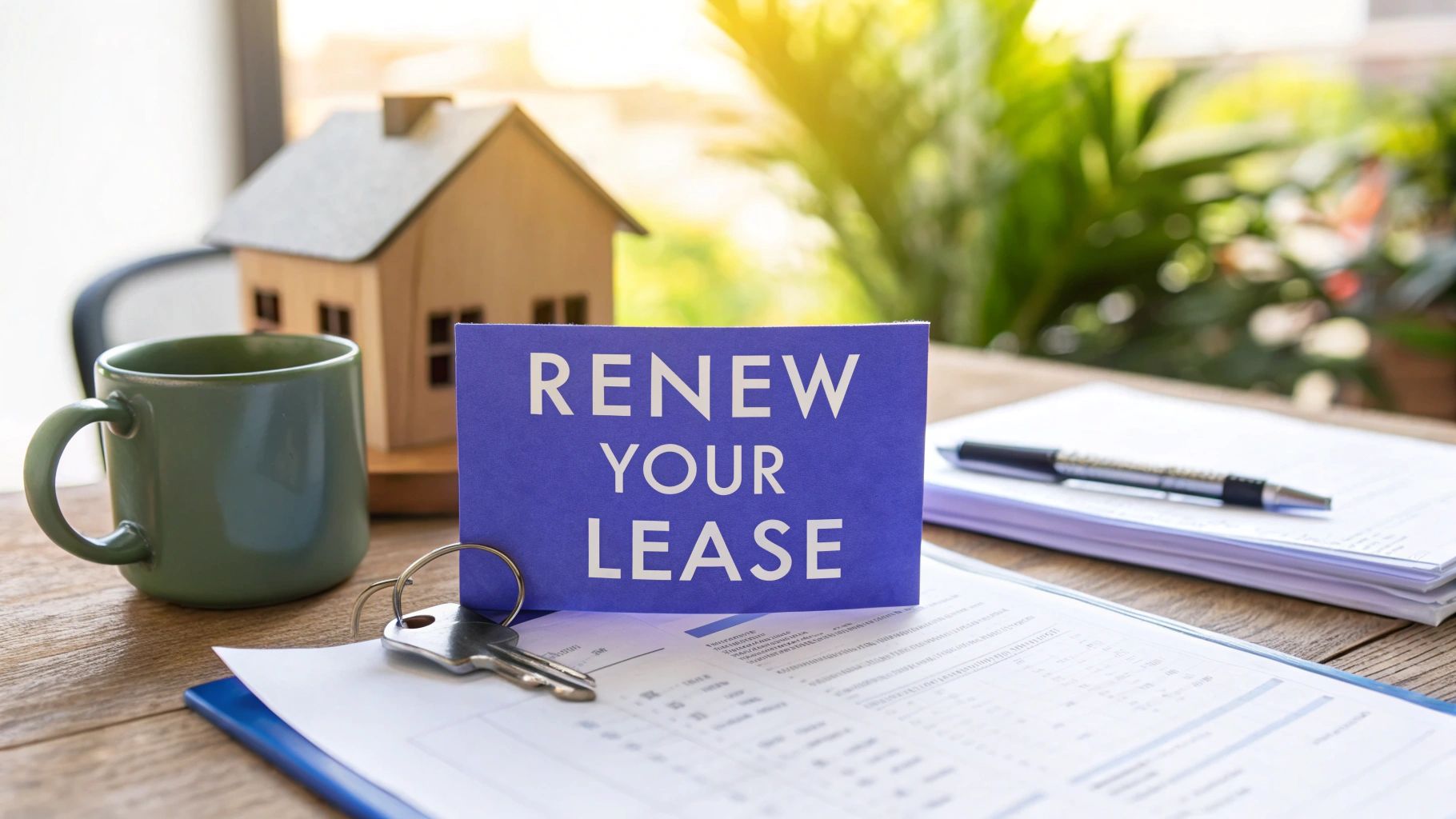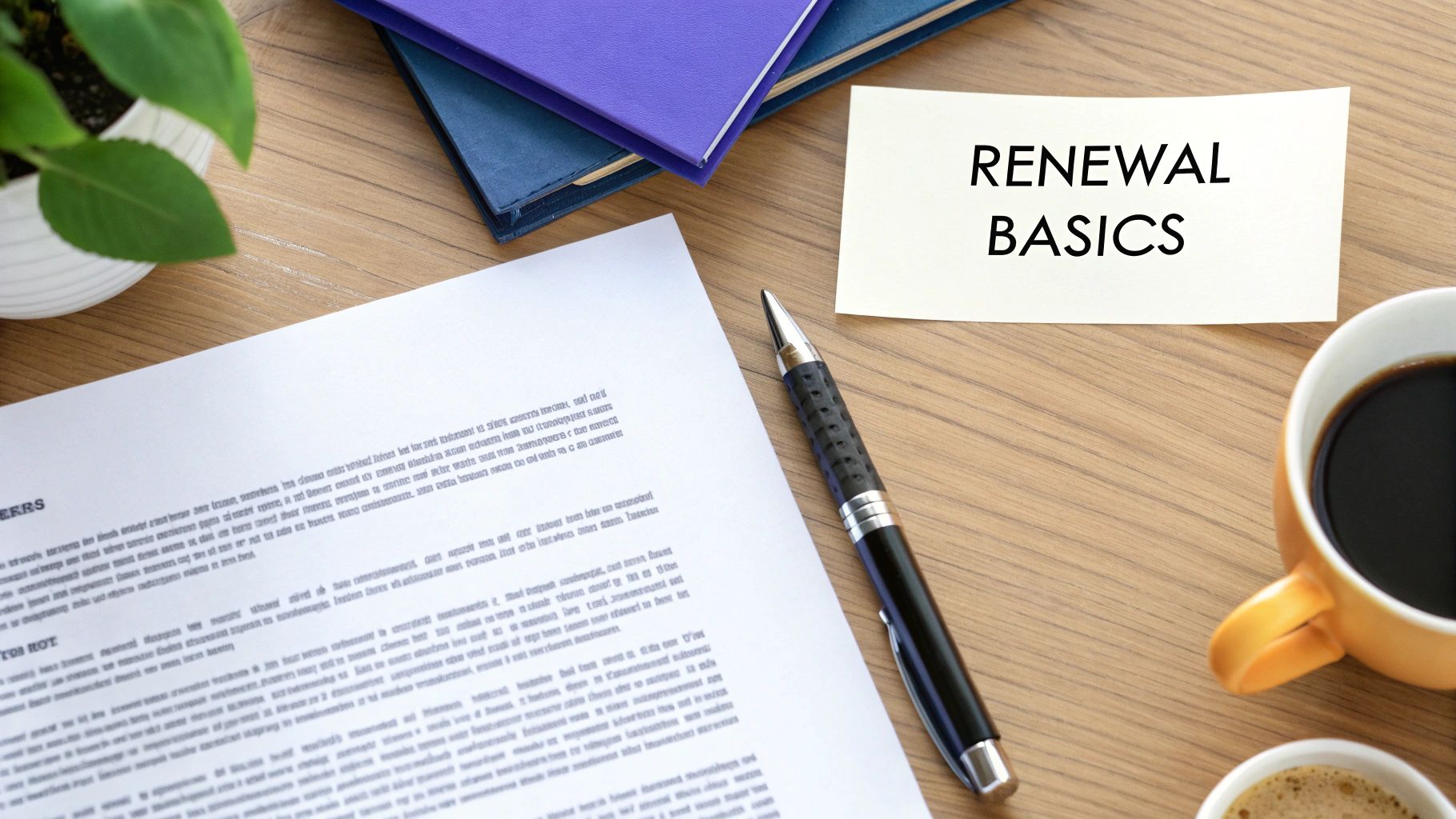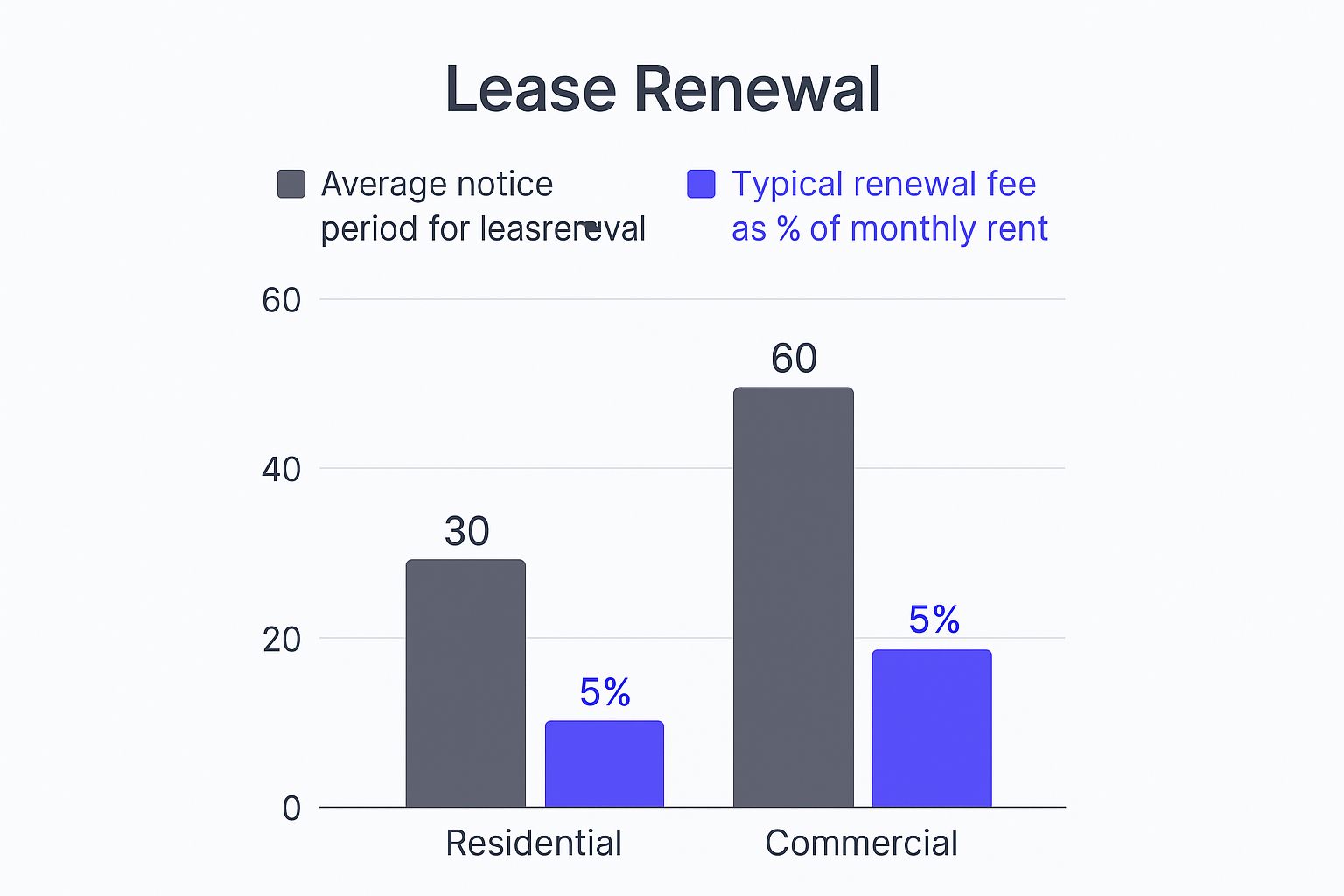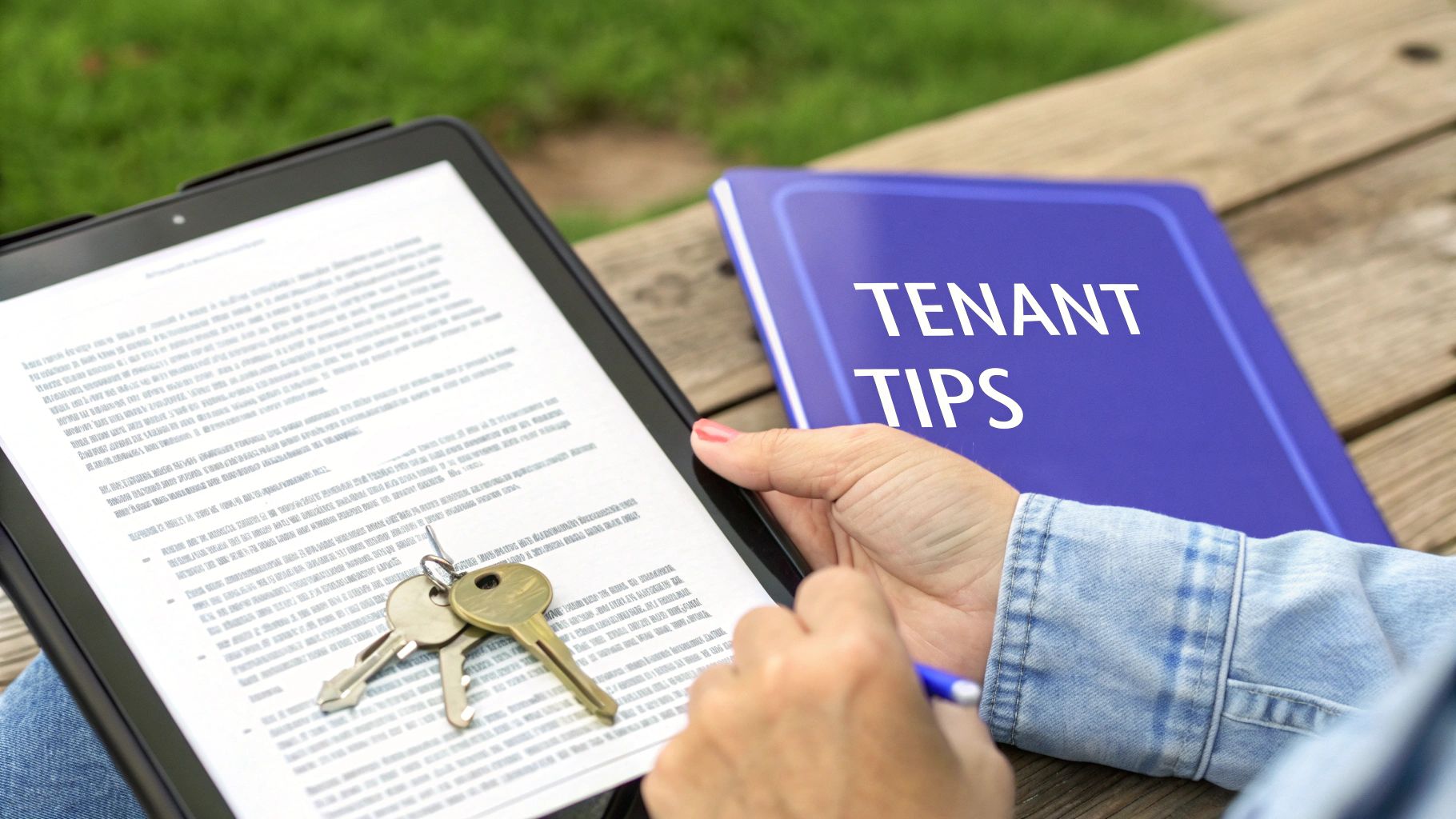
Why The Lease Renewal Game Has Completely Changed

Let me tell you something: the balance of power in lease renewals has really shifted. It's now much more in the tenant's favor. Lots of renters don't realize this, but landlords are now often keen to keep existing tenants rather than search for new ones. Why? Turning over a unit is a major expense.
Think about it: every time a tenant moves out, the landlord has a vacancy period where they're not getting any rent. Then they have to advertise, screen applicants, and get the place ready for the next tenant. I've talked to property managers, and these costs can easily add up to 3-6 months of rent. Ouch.
That's a huge incentive for landlords to hold onto good tenants. Savvy renters are starting to understand this and use it to their advantage when it's time to renew. And this isn’t just my opinion. Even in commercial real estate, we see this trend. Global Net Lease, Inc., for instance, recently reported a 95% leased portfolio. This shows how much the market values the stability of renewals and long-term leases. It's even more true now, when finding a good property is so tough. Businesses are much more likely to renew than go through the hassle of finding a new place.
So, how can you use this to your benefit? It all starts with seeing things from the landlord's point of view. They're not just looking at the rent; they're also thinking about the risk and hassle of finding someone new. A reliable tenant who pays on time and takes care of the property is gold.
Picking up on hints that your landlord wants you to stay is important. Are they quick to fix things when you report a problem? Have they talked about upcoming improvements to the building? These could be signs they’re hoping you’ll renew. By understanding how landlords think, you can position yourself as the perfect tenant and have a real advantage when it’s time to negotiate your renewal. This changed rental landscape presents some great opportunities, and in the following sections, I'll give you the tips and strategies to make the most of them. Next up: we’ll talk about timing – something so many tenants get wrong when renewing their lease.
Getting Your Timing Right (Most People Blow This)
I've seen so many tenants fumble their lease renewals simply by approaching their landlord at the wrong time. There's a real sweet spot for maximizing your leverage, and it's probably not when you think. Talking renewal too early can make you seem desperate. Waiting until the last minute, however, hands all the power to the landlord.
Let's explore the best timeframe for both residential and commercial leases. I'll share a few real-world examples to illustrate the optimal timeline for boosting your negotiating power. For example, my friend, a baker, learned this the hard way. His commercial lease was up, and he waited far too long to talk to his landlord. Another business swooped in, and he lost all his bargaining power. He ended up stuck with a higher rent just to avoid relocating his entire bakery.
Timing Considerations for Different Leases
Different lease types require different strategies. A standard one-year residential lease is a different ballgame than a five-year commercial lease. Seasonal factors also play a surprisingly significant role. In many cities, the rental market peaks in the spring and summer. Starting the conversation in the fall or winter, when demand is lower, might give you an advantage. Understanding local market trends is key.
Notice Requirements: A Strategic Tool
Most leases have clauses specifying how much notice you need to give before renewing or moving out. Think of these as a starting point, not the final word. Don't just meet the minimum; use them strategically. Giving notice a little earlier than required shows you're organized and proactive. This can make a good impression, positioning you as a responsible tenant they'll want to keep. It's a subtle way of showing your value.
This sets the stage for a smoother, more successful renewal process. Now that we've covered timing, let's talk about how to build a strong case for your renewal.
Building Your Negotiation Arsenal Before You Need It

Walking into a lease renewal conversation unprepared isn't a good idea. Tenants who consistently get the best deals do their homework. Weeks before negotiations even begin, they gather information to build a strong case. This preparation changes their position – they become renters landlords actually want to keep.
One of the most important things to do is figure out the market value of similar rentals in your area. Don't guess. Use the same online tools property managers use. Sites like Zillow, Apartments.com, and Craigslist can give you a realistic picture of what similar units are renting for. Pay attention to the details: square footage, amenities, and location. Having this data gives you a solid base for your negotiation.
Also, think about what makes you a good tenant. Do you always pay rent on time? Have you kept the property in great shape? Made any improvements that benefit the landlord? Write these things down. A solid payment history, careful upkeep, and even small improvements can be powerful reasons for a landlord to keep you around.
Think beyond rent, too. What other leverage points do you have? Maybe the building has maintenance issues the landlord hasn’t fixed. Or perhaps the local rental market is slow. These things can influence a landlord’s willingness to negotiate. For example, a friend of mine negotiated a smaller rent increase because he pointed out unresolved maintenance problems in the building’s common areas.
The residential real estate leasing market is growing a lot; it’s expected to hit US$5.62 trillion by 2025. This shows more renters are renewing their leases, looking for stability and convenience. Discover more insights into these leasing trends. This trend towards renewals can help your case, showing that longer-term tenancy is becoming more common. So, gather your information, understand your market, and build your case. This prep work is your secret weapon for getting the best deal when renewing your lease. Next, we'll talk about the actual negotiation – it's about more than just the monthly rent.
The Real Art Of Lease Negotiation (Beyond Just Rent)

The infographic gives a good overview of average notice periods and typical renewal fees. Notice the difference between residential and commercial leases? Commercial leases often need more notice (60 days versus 30) and might have higher renewal fees (8% of monthly rent versus 5%). Keep these differences in mind as you prepare for your own lease renewal.
Most people fixate on rent during negotiations. Important, yes, but it's not the whole story. I've found that truly successful negotiations go deeper, addressing several terms and understanding what your landlord actually cares about. For example, maybe instead of haggling over a small rent decrease, you push for a longer lease at the current price. This gives the landlord stability, and you potentially lock in a good rate for the future.
Thinking Beyond The Monthly Rent
Smart negotiators get creative. Let's say your landlord isn't budging on rent. Don't get stuck! Explore other possibilities, like an improvement allowance. I've seen tenants successfully negotiate credits for new appliances or a fresh coat of paint in exchange for committing to a longer lease. Everybody wins – you get a nicer place, and the landlord improves the property's value.
Another option? Cost-sharing arrangements. Maybe you're handy and could handle some minor maintenance – landscaping or snow removal, perhaps – in exchange for a break on rent or other perks. This can save your landlord money on contractors and give you more control over your living or working space. For a clearer understanding of typical lease terms, check out this helpful guide: Understanding Lease Terms.
I've put together a table below to help you think strategically about different aspects of your lease. It highlights the difference between what's typically negotiable and what's often fixed.
| Lease Term | Negotiability Level | Success Rate | Best Approach |
|---|---|---|---|
| Monthly Rent | Medium | Varies widely based on market conditions | Provide market data supporting your desired rate |
| Lease Duration | High | Generally successful | Offer longer term for better rent or other concessions |
| Improvement Allowance | Medium | Can be successful with strong justification | Tie to longer lease commitment and property value enhancement |
| Maintenance Responsibilities | Medium | Often successful for minor tasks | Offer to handle tasks like landscaping for rent reduction |
| Parking | Low to Medium | Depends on availability and landlord policy | Clearly outline needs and propose solutions |
| Pet Policies | Low to Medium | Dependent on landlord's pet policy | Offer pet deposit or references |
| Utilities | Low | Typically fixed unless included in rent | Explore sub-metering options if applicable |
This table provides a general framework. Remember, every situation is unique, and your success depends on various factors, including your landlord's personality and local market conditions.
Avoiding Common Negotiation Pitfalls
So many tenants unintentionally mess up their negotiations by making basic mistakes. Demanding unrealistic concessions or starting too aggressively can put your landlord on the defensive. Focus instead on building a collaborative relationship. Present reasonable requests supported by market data and your track record as a good tenant. This makes it easier for your landlord to see things from your perspective.
Another mistake? Focusing only on the short term. A tiny rent decrease might seem great now, but if it strains your relationship with your landlord, it can create bigger problems down the road. A positive relationship with your landlord is priceless, especially when unexpected issues arise. A collaborative approach to renewing a lease agreement benefits everyone involved.
Mastering The Renewal Conversation That Matters

So, you've done your homework. You've researched local market rates and thought through your ideal lease terms. Now comes the real test: actually talking to your landlord about renewing. Trust me, even with the best prep, a clumsy conversation can throw everything off. Think of it like baking – great ingredients don't guarantee a good cake if you don't bake it right. The key is starting the conversation the right way, without making your landlord feel defensive.
How do you do that? By setting a positive and collaborative tone. Instead of barging in with a list of demands, begin by expressing how much you appreciate the property and your wish to stay. A simple "I've really enjoyed living here, and I'd love to chat about renewing my lease" can work wonders. It's like starting a negotiation with a genuine compliment - it sets a much more receptive mood.
Language That Works
The words you choose have a big impact. Framing your requests as questions, rather than demands, can make all the difference. Instead of declaring "I want a lower rent," try something like, "Considering current market rates, would you be open to adjusting the rent for the renewal?" This invites a discussion, not a standoff.
Backing up your requests with solid reasoning is just as important. Explain your thinking clearly and concisely, using the market research you’ve gathered. For example, "I've noticed similar units in the area are renting for a bit less. Given my consistent on-time payments and responsible tenancy, I was hoping we could find a rate that works for us both." This reasoned approach is far more effective than just saying "I want a discount." It shows you’re serious and have put thought into it.
Reading The Room and Adapting
Like any conversation, renewing a lease involves picking up on the other person's signals. Pay attention to your landlord’s responses. Are they engaged and open, or hesitant and dismissive? Being flexible and adjusting your approach is key. If they seem resistant to a rent reduction, maybe shift the focus to other negotiable terms, such as a longer lease term or an allowance for property upgrades. The goal is finding common ground and an agreement that benefits everyone. Interestingly, the global leasing industry has grown significantly, by 76% over the past decade. Even in 2023, new business volume rose by 5.7%, showing how important lease agreements are worldwide. Discover more insights into this global trend.
Following Up and Documenting Everything
Once you’ve talked things through, follow up quickly with a written summary of the main points and any agreements you reached. This reinforces what was discussed and creates a valuable record in case any questions come up later. It’s a simple step that can save you a lot of hassle down the line. A well-documented renewal process protects both you and your landlord and ensures a smooth transition into the new lease term.
When Renewals Go Sideways (And How To Fix Them)
Even the best-laid plans can go awry. Lease renewals are no exception. Sometimes, despite all your preparation, things just don't go smoothly. But knowing how to handle those bumps in the road can make all the difference. It's the difference between a stress-free renewal and a total nightmare. Let's talk about some common sticking points and how to navigate them.
Handling Rent Hike Proposals
Rent increases are probably the most frequent issue people face during a lease renewal. Your landlord might propose a significant jump in rent, which can be a bit of a shock. But before you panic, remember that market research you did? This is where it really pays off.
Present your findings to your landlord in a calm, professional manner. Show them comparable rental rates for similar properties in your area. This gives you solid ground to stand on. And remember, negotiation is a two-way street.
If the landlord won't budge on the rent, think about negotiating other terms. Maybe you could agree to a longer lease term in exchange for a smaller rent increase. Or perhaps you could negotiate an allowance for property upgrades. There are often other levers you can pull.
Navigating Mid-Negotiation Changes
Sometimes, a landlord might try to change the terms of the lease during the negotiation process. This happened to a friend of mine. He was in the middle of renewing his lease, and suddenly the landlord wanted to add a substantial pet fee – even though pets were clearly allowed in the original lease!
He calmly, but firmly, pointed this out to the landlord, referencing the original lease agreement. And guess what? The landlord backed down. The lesson here? Documentation is everything. Keep records of all communication and your previous lease agreements. This allows you to address any discrepancies and keeps everyone focused on the initial terms.
Dealing with Unresponsive Landlords
What happens if your landlord just goes silent? Don’t just let it go. Send polite but persistent follow-up emails or letters. If you’re still getting radio silence, consider sending a certified letter, which requires a signature upon receipt. This not only creates a record of your attempts to communicate, but it also shows you’re serious about renewing. Sometimes, a little nudge is all it takes. For more information on tenant rights and other strategies, check out our guide on how to break a lease. It might offer helpful insights even if you're planning to stay.
Maintaining Positive Relationships
Even when negotiations get tricky, try to maintain a positive relationship with your landlord. Approach the renewal as a collaborative process, focusing on solutions that benefit both of you. A good landlord-tenant relationship can make a world of difference, not just during renewals, but throughout your tenancy. Turning potentially difficult conversations into opportunities for mutual understanding can lead to smoother renewals and a much more pleasant living experience.
Let's face it, renewals can be challenging. But with a little foresight and the right approach, you can navigate the process successfully. The table below outlines some common challenges and offers proven strategies to help you through.
A quick look at some of the more frequent issues tenants encounter during lease renewals and some practical solutions for each situation:
| Challenge | Frequency | Recommended Response | Success Tips |
|---|---|---|---|
| Rent Hike Proposals | High | Research comparable rents and present your findings. Negotiate other terms if the rent is non-negotiable. | Stay calm and professional. Focus on mutually beneficial solutions. |
| Mid-Negotiation Changes | Moderate | Refer to the original lease agreement. Document all communication. | Be assertive but respectful. |
| Unresponsive Landlord | Low | Send persistent follow-up emails/letters. Consider a certified letter. | Keep records of your attempts to contact the landlord. |
| Difficult Communication | Moderate | Maintain a professional and respectful tone. Focus on clear and concise communication. Seek mediation if needed. | Try to understand the landlord’s perspective. |
| Maintenance Concerns | Moderate | Document existing issues and discuss them with the landlord. Propose solutions, like repairs or rent adjustments. | Provide clear evidence of the issues (photos, videos). |
By understanding these common challenges and employing effective response strategies, you'll be well-equipped to navigate your next lease renewal with confidence. Remember, preparation and open communication are key to a smooth and successful outcome.
Closing The Deal And Setting Yourself Up For Success
So, you've successfully navigated the lease renewal negotiation – give yourself a pat on the back! But before you celebrate, there are a few essential steps to ensure a smooth transition into your renewed lease term and avoid future headaches. I’ve seen too many tenants focus only on the agreed-upon terms and completely overlook these final stages. Trust me, confirming everything is documented correctly is just as important as the negotiation itself.
Think of it like this: you've spent time carefully selecting the perfect ingredients for a delicious cake (your lease terms). Now, you need to make sure you bake it properly (finalize the paperwork) to enjoy the best results (a hassle-free tenancy).
Verifying The Final Lease Agreement
This is where you put on your detective hat. Don't just skim the final lease agreement – really read it. Make sure every single detail lines up perfectly with what you agreed upon during negotiations. Everything from the monthly rent and lease duration to those sometimes-pesky pet clauses and maintenance responsibilities needs to be checked.
I learned this the hard way once. I renewed a lease assuming everything was correct, only to find out later there was a significant difference in what I thought was included in the utilities. Catching these errors before you sign can save you from a world of frustration down the road. If anything seems off, even slightly, don't hesitate to ask about it.
Addressing Discrepancies
What if you do find a discrepancy? Don’t panic! Address it immediately and professionally with your landlord. This is where good record-keeping comes in handy. Refer to your notes from the negotiation process and any supporting documentation you may have.
For example, let's say the agreed-upon rent is different from what appears in the lease. Politely point out the error and provide evidence of the agreed-upon amount. A clear, documented record of your negotiations is incredibly valuable in these situations. If negotiations break down and you're considering other options, you might want to know how to cancel a lease agreement.
Setting Expectations For The Renewed Term
Renewing a lease isn't just about the document itself. It's about setting the stage for a positive and productive landlord-tenant relationship throughout the new lease term. Open communication is key here. Discuss any anticipated changes or concerns you have upfront.
This proactive approach can help maintain a strong, positive relationship with your landlord and ensure a smooth tenancy. It also puts you in a good position for future renewals. Think of it as an investment in your future peace of mind.
Finalizing The Renewal Process
Once everything is confirmed and you're happy with the lease agreement, sign it and keep a copy for your records. It might seem obvious, but you wouldn't believe how many people misplace their lease, creating unnecessary stress later on. A properly signed and stored lease is your protection and proof of the agreement.
By paying close attention to these final, often overlooked steps, you're setting yourself up for a successful start to your new lease term. This preparation minimizes the chances of unexpected surprises and helps avoid potential disputes down the line. It’s all about starting strong and maintaining a positive relationship with your landlord.
Ready to simplify your legal documents and make informed decisions with confidence? Visit Legal Document Simplifier today!